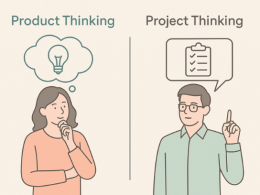Transitioning from Fintech to Product Management can be an excellent career move for those looking to expand their skillset and broaden their career prospects. Product management requires a unique set of skills and experience, and combining this with fintech expertise can be a winning combination.
The Fintech industry has exploded in recent years, and it’s no secret that it’s a fast-paced and innovative field. However, as the industry continues to evolve, so do the career opportunities within it.
For those who have spent time working in fintech and want to expand their skillset, product management is a logical next step.
The Career Change: From Fintech to Product Management
Here are some tips on how to make a successful transition-

1. Build your Product Management knowledge
Transitioning into a new career field can be challenging, especially if you’re unfamiliar with the industry’s practices and methodologies. To build a solid foundation in product management, you need to invest some time in learning about the field. This can be done by reading books, articles, blogs, and industry publications that discuss the latest trends, best practices, and frameworks related to product management.
There are numerous Product Management methodologies and frameworks that you can learn about, such as Agile, Scrum, Lean, and Design Thinking. Each of these methodologies has its own set of principles and practices that guide product development and management.
Familiarizing yourself with these methodologies will help you understand how product management operates and enable you to apply the right principles and practices to your work.
You can also consider enrolling in courses or workshops that teach Product Management skills. These programs can provide you with hands-on training on product management methodologies, tools, and techniques. They may cover topics such as market research, product strategy, product roadmap planning, user experience design, and product launch planning.
Taking such courses or workshops can be an excellent way to build your product management knowledge and gain practical skills that you can apply to your work.
2. Leverage your Fintech Expertise
Your experience in fintech is a valuable asset in product management. As a product manager, your role is to oversee the development and success of a product. You’ll be responsible for everything from defining the product’s features, setting the product roadmap, and managing the product’s lifecycle.
Your experience in fintech can be helpful in several ways:
First, you have a deep understanding of the industry, including its products, services, and trends. You’re familiar with the challenges and opportunities that exist in the market and have a good sense of what customers are looking for.
Second, you have knowledge of the technologies used in the industry, including the latest developments and emerging trends. This can be beneficial when developing a product as you can ensure that the product incorporates the latest technology trends and aligns with the company’s technological capabilities.
Third, you have experience working with different types of fintech products, such as payment processing, digital wallets, or mobile banking apps. This experience can be useful when designing new products, as you can draw upon your understanding of what works and what doesn’t work in the fintech industry.
3. Build your Network
Building your network is an important step in any career transition, including transitioning into a product management role. Networking can provide you with insights, advice, and opportunities that can help you succeed in your new role.
To build your network, you can start by attending industry events and conferences related to product management. These events provide opportunities to meet people in the field, learn about new products, technologies, and trends, and network with industry experts. Participating in discussions and asking questions at these events can help you connect with like-minded individuals and gain valuable insights.
You can also join online communities or groups related to product management or fintech on social media platforms or professional networking sites. These communities can provide you with access to a diverse group of individuals who share similar interests and experiences. Engaging with members of these communities can help you build connections and stay up-to-date with the latest trends and developments in the industry.
Additionally, you can connect with Product Managers in your network and seek their advice and guidance. They can provide you with insights into the industry, share their experiences, and help you navigate the challenges and opportunities that come with transitioning into a new role.
4. Develop your Soft Skills
Product Management is not just about technical expertise. It requires excellent communication skills, leadership skills, and the ability to work with cross-functional teams. Developing your soft skills can help you become a more effective product manager and advance your career.
Some key soft skills that are essential for product managers include:
A. Communication Skills- Product managers need to be able to communicate effectively with stakeholders, customers, and cross-functional teams. They need to be able to explain complex ideas in a way that everyone can understand and convey information in a clear and concise manner.
B. Leadership Skills- Product managers need to be able to lead teams, motivate others, and manage conflicts effectively. They need to be able to set clear goals, provide direction, and delegate tasks to team members.
C. Collaboration Skills- Product managers need to work effectively with cross-functional teams, including engineering, design, marketing, and sales. They need to be able to build relationships with team members, understand their needs, and work together to achieve common goals.
By developing your soft skills, you can become a more effective product manager and build stronger relationships with your team members, stakeholders, and customers.
5. Be Open-minded
Transitioning from Fintech to product management may come with its own set of challenges, including adapting to a new role, new team dynamics, and new ways of working. It’s important to approach this transition with an open mind, and to be willing to learn from your experiences and mistakes.
Being open-minded means being receptive to new ideas, perspectives, and approaches. It means being flexible and adaptable in the face of change, and being willing to try new things.
In Product Management, being open-minded can help you navigate the constantly evolving landscape of technology and customer needs, and to come up with innovative solutions to complex problems.
It’s important to stay focused on your goals and to be patient with yourself as you make the transition. You may encounter obstacles along the way, but these challenges can also provide valuable opportunities for growth and learning. Embrace these challenges, and use them as a chance to develop new skills, broaden your knowledge, and expand your horizons.
In conclusion, transitioning from Fintech to Product Management can be an exciting career move. It allows you to leverage your fintech expertise while expanding your skillset and contributing to the overall success of the product.
By building your product management knowledge, leveraging your fintech expertise, building your network, developing your soft skills, and being open-minded, you can successfully navigate this transition and build a rewarding career in Product Management.
If you want to make a grand entry into the product management world, then our Product Management certification is the exact course that you can pick!To know more about product management, check out our blog page.






